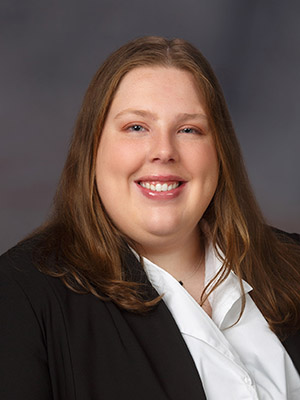Fellow Statements
- CRRC Home
- About the CRRC
- 2023 Graduate Student Cardiovascular Renal Research Symposium
- Current Trainees
- Prospective Trainees
- Apply Now
- Core Facilities
- Contact the CRRC
- Support the Cardiovascular-Renal Research Center
Allie Smith
 I first became interested in neuroscience at Judson College, when I took a neuroscience course during my junior year. This experience led me to participate in the Judson College Honors Program, a program in which seniors at the school could develop a small research project with a faculty member. Judson College was not well-funded for research, so this program was one of the few opportunities for students to perform research that is not part of a lab course. For my project, I partnered with Dr. Mary Anne Garner in the Department of Biology, and the project centered on the impact of treating cells that were induced to be dopaminergic with 3-nitrotyrosine. Nitrotyrosine has been implicated in Parkinson’s disease, and it is a marker for oxidative and nitrative stress. The goal of this project was to identify if dopaminergic cell differentiation, cell growth, or cell death processes are affected by the nitrotyrosine treatment. I was able to help design and run experiments throughout the duration of this project. However, due to the COVID-19 outbreak in the spring of 2020, the project had to be shut down prematurely. Despite this, my great experiences with the Honors Program and my neuroscience course fueled my desire to pursue a long-term career in neuroscience research.
I first became interested in neuroscience at Judson College, when I took a neuroscience course during my junior year. This experience led me to participate in the Judson College Honors Program, a program in which seniors at the school could develop a small research project with a faculty member. Judson College was not well-funded for research, so this program was one of the few opportunities for students to perform research that is not part of a lab course. For my project, I partnered with Dr. Mary Anne Garner in the Department of Biology, and the project centered on the impact of treating cells that were induced to be dopaminergic with 3-nitrotyrosine. Nitrotyrosine has been implicated in Parkinson’s disease, and it is a marker for oxidative and nitrative stress. The goal of this project was to identify if dopaminergic cell differentiation, cell growth, or cell death processes are affected by the nitrotyrosine treatment. I was able to help design and run experiments throughout the duration of this project. However, due to the COVID-19 outbreak in the spring of 2020, the project had to be shut down prematurely. Despite this, my great experiences with the Honors Program and my neuroscience course fueled my desire to pursue a long-term career in neuroscience research.
For my graduate training at the University of Mississippi Medical Center, I have joined the lab of Dr. Bernadette Grayson to study the relationship of diet and traumatic brain injury in the pediatric population. As a graduate student in Dr. Grayson’s lab, I have had the ability to learn different techniques common to neuroscience and metabolic studies. I am currently working to evaluate potential changes to cognition following traumatic brain injury in juvenile rats who are fed a high-fat, high-sugar diet, and I hope to submit this data as a first-author publication within the next several months. I am very excited to be continuing my education in Dr. Grayson’s lab at the University of Mississippi Medical Center. I grew up on a poultry farm in a very rural area of Alabama, and, knowing that I did not want to continue working on the farm into adulthood, gaining an education to enter a different field was always important to me. At the end of my graduate career, I will become the first person in my family to obtain a PhD. I believe that the educational environment at the University of Mississippi Medical Center and the proposed research plan described provide a good foundation and springboard for my future goal of entering academia to conduct my own neuroscience research on traumatic brain injury.


